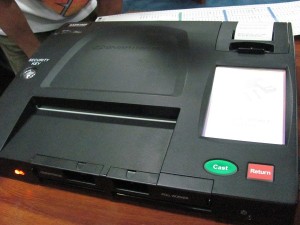
Smartmatic Asia president Cesar Flores predicted that between 200 and 300 precinct count optical scan (PCOS) machines could break down and need replacement nationwide, something which he considered typical in any automated polls.
“What I see right now is consistent with what happens in any other country in the world. I mean you will have machines failing during Election Day,” he told reporters at the Philippine International Convention Center, where the national canvassing of votes would be held later Monday.
“It feels very uncomfortable when it happens precisely in your precinct. But it will happen in, I don’t know, one, 200, 300 precincts, out of the 78,000 precincts nationwide, and it will happen randomly throughout the day,” he said.
He said most of the failures would likely have happened on the testing and sealing of the PCOS machines.
“Any hardware will fail. I guarantee you, if we will buy 78,000 iPhones, we will have to send back to the store about a hundred to 200, and during the day, another hundred will fail. That’s the nature of hardware and IT,” he said.
But he conceded that a lot more was at stake with any machine failure during an election.
“In regular life, it wouldn’t affect you because you will get a replacement within one or two days, but on Election Day, you have to have that replacement within one hour,” he said.
“And that’s the key, and that’s where I think the Comelec is doing a good job because they have these over 2,000 machines all over the country and they’re able to do the replacement because Comelec is in
constant communication with the election officers in the field,” Flores said.
He noted that the Comelec had a facility called the National Support Center, which would let the Comelec know “in real-time” what was going on, and take appropriate steps to fix problems.
“Again, it’s not unexpected that these things happen. What we have to trust is that the Comelec will fix this in time when it happens, whether it is caused by the hardware itself, or it is human error,”
Flores said.